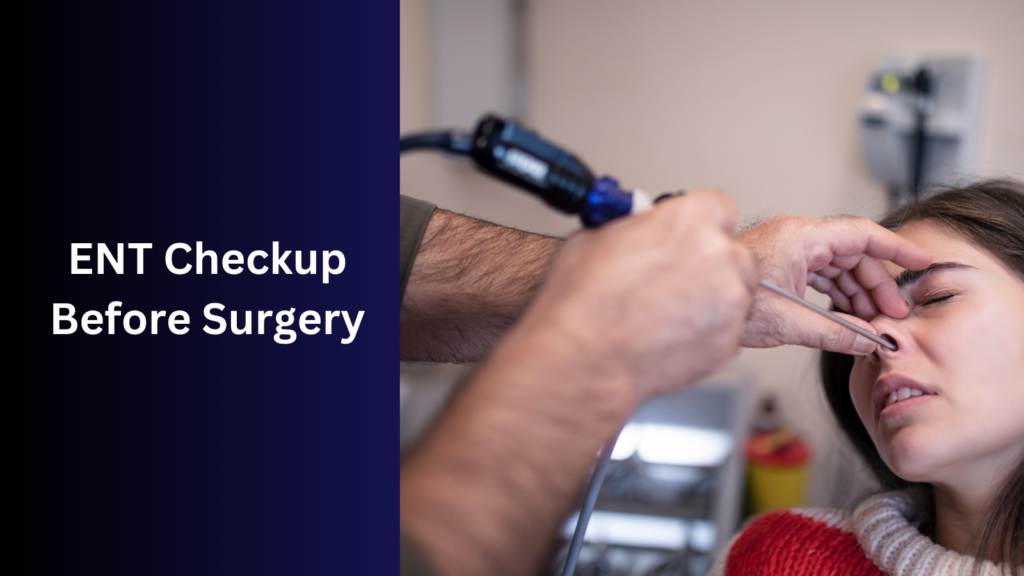Surgery, regardless of its type, puts your body under stress. Your health must be evaluated comprehensively before the procedure to ensure the best outcomes. One critical aspect often overlooked is a thorough ENT (ear, nose, and throat) checkup. This evaluation safeguards against potential complications and ensures that your surgical team has all the information needed to proceed safely.
Importance of ENT Checkups for Pre-Surgery Health
Your ears, nose, and throat are integral to breathing, swallowing, and overall airway health. Any undiagnosed condition in these areas could complicate surgery. Issues like undetected sinus infections or throat obstructions might cause discomfort and pose risks during anesthesia or recovery. An ENT checkup ensures that your surgical readiness is assessed from every angle.
How ENT Issues Can Impact Surgical Outcomes
Even minor ENT issues can have significant consequences in surgery. Consider these examples:
- Breathing Problems: Conditions like nasal congestion or sleep apnea can interfere with proper oxygenation during surgery.
- Infections: Chronic or acute ENT infections are more likely to spread to other areas during or after the procedure.
- Structural Issues: Deviated nasal septum or throat blockages can complicate airway management, especially during intubation.
By identifying and addressing these concerns in advance, you reduce the risk of surgical complications.
Identifying Hidden Ear, Nose, and Throat Problems Before Surgery
Not all ENT issues present apparent symptoms. During a checkup, specialists use advanced diagnostic tools like endoscopy, imaging scans, or hearing tests to uncover hidden problems, such as:
- Sinus Blockages: These can cause post-surgical infections if left untreated.
- Polyps or Growths: These may interfere with breathing or cause complications with anesthesia.
- Hearing Issues: Sometimes overlooked, untreated hearing problems can impact post-operative recovery, especially in balance or coordination cases.
Preventing Post-Surgery Complications with ENT Screenings
Post-surgical complications can be debilitating, and many stem from undiagnosed ENT issues. Common complications include:
- Respiratory Distress: ENT infections can exacerbate breathing difficulties during recovery.
- Delayed Healing: Infections or inflammation in ENT areas can slow overall recovery.
- Wound Infections: Untreated ENT conditions can introduce bacteria to the surgical site for surgeries near the face or neck.
A pre-surgical ENT screening minimizes these risks, ensuring a smoother recovery process.
The Role of ENT Tests in Ensuring Surgical Safety
ENT tests are crucial for providing a complete health picture. Key assessments include:
- Endoscopy: To evaluate nasal and throat structures for blockages or abnormalities.
- Audiograms: To assess hearing and balance, especially for patients undergoing head or neck surgeries.
- CT or MRI Scans: To detect hidden sinus infections, growths, or other structural issues.
These tests allow surgeons to plan precisely, ensuring no unexpected issues arise during the procedure.
Preparing for Surgery: Why ENT Health Matters
Proper ENT health is essential for:
- Smooth Anesthesia Administration: A clear airway is critical for safe sedation.
- Reducing Risks of Complications: Addressing conditions like chronic sinusitis prevents infection-related setbacks.
- Faster Recovery: Patients with optimal ENT health experience fewer complications and quicker healing times.
Common ENT Conditions That Can Affect Surgical Recovery
Several ENT conditions may directly impact surgical outcomes and recovery:
- Deviated Nasal Septum: Can hinder breathing and oxygenation during recovery.
- Chronic Sinusitis: Creates an environment prone to infections.
- Allergies: These may cause inflammation, complicating the surgical process.
- Obstructive Sleep Apnea: Increases risks related to anesthesia and post-operative oxygen levels.
Treating these conditions before surgery can significantly enhance your recovery experience.
How an ENT Checkup Helps Reduce Surgery Risks
An ENT checkup serves as a preventive measure, reducing risks by:
- Detecting Hidden Infections: Preventing complications that might arise post-surgery.
- Ensuring Airway Clarity: Critical for surgeries involving intubation or sedation.
- Evaluating Structural Health: Ensuring that no underlying issues interfere with the procedure.
A proactive approach through ENT screenings ensures a safer surgical experience for patients.
The Link Between ENT Health and Anesthesia in Surgery
Anesthesia administration depends heavily on a clear and functional airway. ENT health directly affects this process in the following ways:
- Obstructed Airways: This can make intubation challenging, leading to complications during surgery.
- Chronic Inflammation: This may trigger adverse reactions to anesthesia.
- Infections: Increase the risk of complications under sedation.
A thorough ENT evaluation helps anesthesiologists plan for potential challenges, ensuring patient safety during the procedure.
When Should You Schedule an ENT Checkup Before Surgery?
Schedule your ENT checkup 2–4 weeks before surgery to allow enough time for diagnosis and treatment. This timeframe enables:
- Adequate Treatment: Addressing infections or structural issues before surgery.
- Complete Recovery: Ensuring that any interventions have enough time to heal.
- Comprehensive Planning: Allowing your surgical team to factor ENT health into their preparation.
Conclusion
An ENT checkup is an essential step in pre-surgical preparation. Identifying and addressing potential issues can significantly reduce surgical risks, prevent complications, and ensure a faster recovery. Whether detecting hidden infections, ensuring clear airways, or minimizing risks with anesthesia, an ENT evaluation provides peace of mind for you and your surgical team.
Don’t take chances with your health—schedule an ENT checkup before your subsequent surgery to ensure optimal safety and success.

